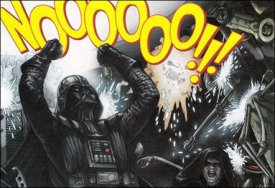http://www.nytimes.com/2008/03/16/w...pVOELtlB1Ydq6yCwJkz0Q&oref=slogin&oref=slogin
Start Writing the Eulogies for Print Encyclopedias
By NOAM COHEN
Published: March 16, 2008
It has never been easier to read up on a favorite topic, whether it’s an obscure philosophy, a tiny insect or an overexposed pop star. Just don’t count on being able to thumb through the printed pages of an encyclopedia to do it.
A series of announcements from publishers across the globe in the last few weeks suggests that the long migration to the Internet has picked up pace, and that ahead of other books, magazines and even newspapers, the classic multivolume encyclopedia is well on its way to becoming the first casualty in the end of print.
Back in the 1990s, Encyclopaedia Britannica led the pack in coming to terms with the idea that the public no longer viewed ownership of the multivolume compendium of information as a ticket to be punched on the way to the upper middle class — or at least as the oracle of first resort for copying a book report.
Sales of Britannica’s 32 volumes peaked in 1990, but in the next six years, they dropped 60 percent, and the company moved quickly to reinvent itself online. In 1996, Britannica eliminated its legendary staff of 1,000 door-to-door salesmen, already down from a high of 2,000 in the 1970s, in the face of competition from Microsoft’s Encarta encyclopedia for home computers.
Jorge Aguilar-Cauz, president of Encyclopaedia Britannica Inc., a private company based in Chicago, said that the print edition was still profitable, but that sales were just 10 percent of what they were in 1990. Customers are mostly schools and libraries.
It was only last month, however, that the publisher of Germany’s foremost multivolume encyclopedia, Brockhaus, took similar action, announcing that in April it would be putting online, free, all 300,000 of its articles, vetted by scholars over 200 years of print editions. (Brockhaus hopes to make money by selling ads on its site.) At the same time, the publishing house said it couldn’t promise that it would ever produce another print edition, something it has done regularly since the encyclopedia appeared in Leipzig in 1808.
Publishers in Denmark and France, too, are rethinking the commercial viability of their encyclopedias. A one-volume French encyclopedia, Quid, lost its publisher last month, and may only survive online. The largest publisher in Denmark, Gyldendal, has decided that the subscription plan for its online encyclopedia is misguided (it stopped a print edition in 2006). It plans to come up with another way to support itself.
“There is some kind of sadness,” said Nicole Weiffen-Aumann, a spokeswoman for Brockhaus, “but on the other side, many people are happy, looking forward to our new product — both things you can find in our company.” She added: “There are many people that say, ‘When I was very young I bought my first encyclopedia from Brockhaus, and there will be no next edition, I can’t believe it.’ ”
The Encyclopedia Americana still has good sales in print volumes, said Greg Worrell, president of Scholastic Classroom and Library Group, but the company is focusing on its online outlets. He said it was still determining a print plan, but added, “the likelihood is there will not be the 2009 multivolume print version.”
To scholars, the ready access to updated information online is a net gain for the public. But that doesn’t mean that they can’t mourn the passing of a household icon — a set of knowledge-packed books on their own reserved shelves that even parents had to defer to.
“I remember in my own childhood in the 1940s, early ’50s, I and my parents would sit around the table and look at the encyclopedia together,” said Larry Hickman, director of a center at Southern Illinois University devoted to the education pioneer John Dewey. “In the old days, the Encyclopaedia Britannica or the World Book encyclopedia was regarded as authoritative,” he recalled, laughing as he agreed, “That’s why you would copy it for your book report.”
But Mr. Hickman said that parents and children can have the same discussions “seated in front of the computer, the electronic hearth, as I like to call it.” And he said that losing a set of books considered infallible was actually a good thing for developing critical thinking.
Yet, as encyclopedia publishers struggle, the Internet age has become a golden one for the newer kind of encyclopedia.
An ambitious project to catalog online all known species on earth — with the even-more-ambitious title the Encyclopedia of Life — went live last month. The Stanford Encyclopedia of Philosophy, a project that began online in 1995 and has never been in print and never will be, is chugging along with nearly 1,000 entries that are vetted by an academic board of more that 100 scholars for a total of 10 million words.
And then there is the behemoth Wikipedia, a project that has no board to vet articles and is created by thousands of volunteers, with more than two million articles in English and an additional five million in a babel of other languages.
Wikipedia is regularly among the top 10 most visited sites on the Internet throughout the world — maybe in part because there’s a lot more there than meets the needs of the average term paper. The superabundance of less-than-prized information on the site has led to a phenomenon called “wiki-groaning,” which involves comparing the length of seemingly disparate articles to humorous effect. Lightsaber Combat beats out Modern Warfare, for example, and John Locke, the character from the TV show “Lost,” edges out the other John Locke, whoever he was.
Encyclopedia publishers, while taking swipes at Wikipedia’s unreliability since it can be edited by anyone, have clearly adopted some of its lessons. They are incorporating more photographs and suggestions from readers to improve online content, and they are committed to updating material as facts change.
Britannica says it updates an article every 20 minutes. Even the Stanford Philosophy Encyclopedia will make changes with relative speed. When a law was passed on voluntary euthanasia in the Netherlands, “our entry was updated within a couple of weeks, at the latest,” said Edward N. Zalta, a senior research scholar at Stanford and principal editor of the online encyclopedia. “It may have been a day or two — we don’t do it as quickly as Wikipedia, but in a timely way.”
In essence, the Internet is justifying the hubris of early compilers like Linnaeus, the father of taxonomy, said Edward O. Wilson, the expert on insects at Harvard who spearheaded the Encyclopedia of Life and serves as honorary chairman. “There were so few species to deal with, only in the thousands,” he said. “He and his disciples thought they could do the rest of the flora and fauna of the world. Boy, were they wrong.”
In the intervening centuries, Professor Wilson said, science was taken over by specialists. But by allowing specialists to pool their knowledge on a Web site, he said, the Encyclopedia of Life will be able to come close to the dream of a compendium of all the known species in the world.
“Once we get all the information in one place, think of the impact this will have — available to anybody, anywhere, anytime,” he said.
Asked about his own experience with encyclopedias, Professor Wilson said, “I grew up in Alabama — we didn’t have things like the Encyclopaedia Britannica in our home.” What he did have were field guides. “All the field guides — for snakes, butterflies, turtles. Back in the 40s, I had my butterfly nets, and I was right up to date through my guides,” Professor Wilson said.
He added: “There are nerds that say we will have something the size of a field guide, and punch in something. Maybe I am hopelessly old fashioned, but a kid with a knapsack, and a Boy Scout or Girl Scout manual, printed, a field guide on snakes or butterflies, printed, is the best combination in the world.”
Mr. Aguilar-Cauz of Britannica is counting on that sort of nostalgic allure to keep at least some encyclopedias on bookshelves and not just hard drives. He envisioned the print volumes living on as a niche, luxury item, with high-quality paper and glossy photographs — similar to the way some audiophiles still swear by vinyl LPs and turntables. “What you need people to understand,” he said, “is that it is a luxury experience. You want to be able to produce a lot of joy, a paper joy.”








